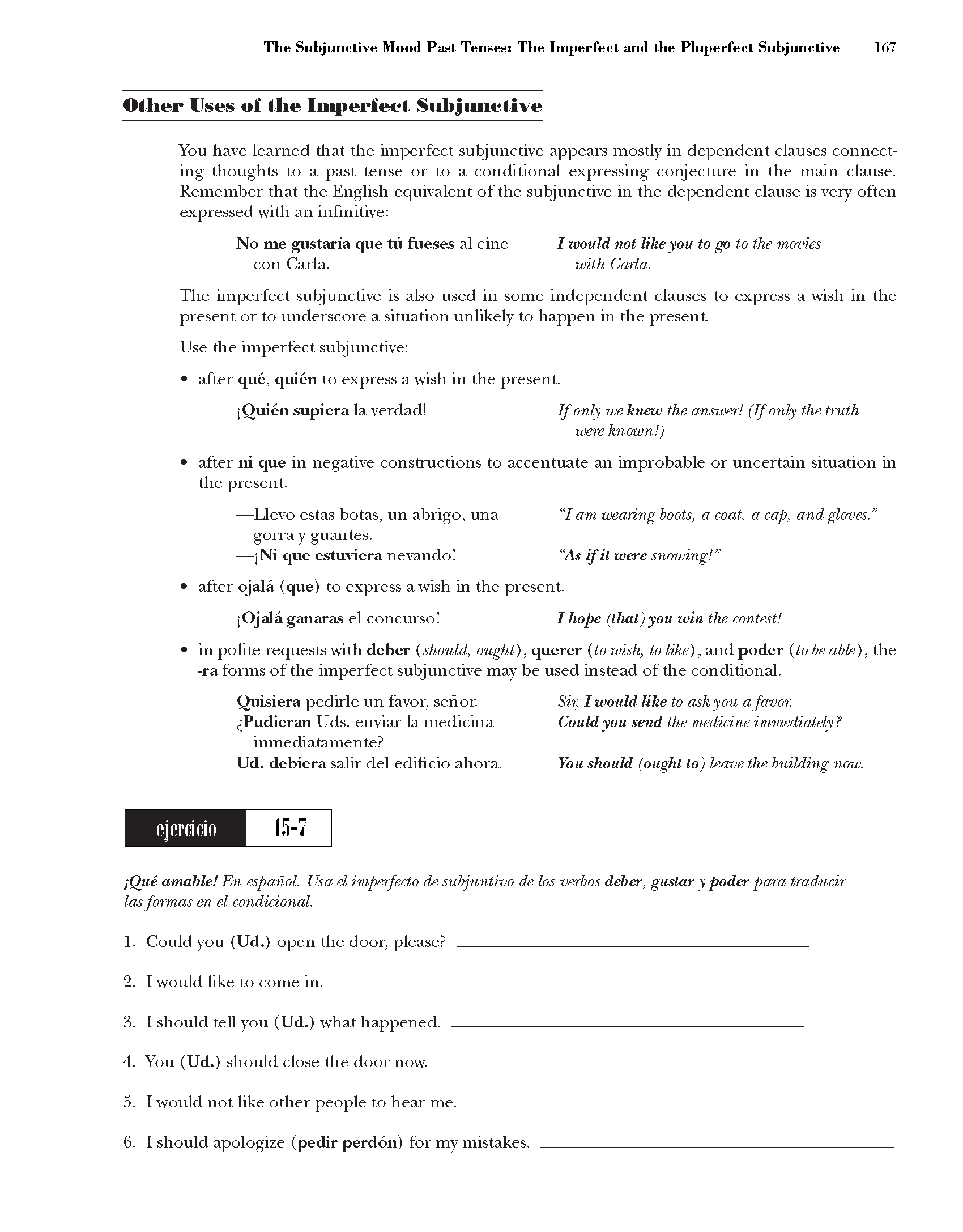CSG178

167
The Subjunctive Mood Past Tenses: The Imperfect and the Pluperfect Subjunctive
Other Uses of the Imperfect Subjimctive
You have learned that the imperfect subjunctive appears mostly in dependent clauses connect-ing thoughts to a past tense or to a conditional expressing conjecture in the main clause. Remember that the English equivalent of the subjunctive in the dependent clause is very often expressed with an infinitive:
No me gustaria que tu fueses al cine I zuould not łikeyou to go to the movies
eon Carla. with Carla.
The imperfect subjunctive is also used in some independent clauses to express a wish in the present or to underscore a situation unlikely to happen in the present.
Use the imperfect subjunctive:
• after que, quien to express a wish in the present.
jQuien supiera la verdad! Ifonly we knezu the answer! (If only the truth
were known!)
• after ni que in negative constructions to accentuate an improbable or uncertain situation in the present.
—Llevo estas botas, un abrigo, una “Iam weańng boots, a coat, a cap, and gloves.”
gorray guantes.
—i Ni que estuviera nevando! “As ifit were snowing!”
• after ojala (que) to express a wish in the present.
jOjala ganaras el concurso! I hope (that) you win the contest!
• in polite requests with deber (should> ought), querer (to wish, to like), and poder (to be obie), the -ra forms of the imperfect subjunctive may be used instead of the conditional.
Quisiera pedirle un favor, seńor. Sir Iwould like to askyou afavor.
;Pudieran Uds. enviar la medicina Gould you send the medicine immediately ?
inmediatamente?
Ud. debiera salir del edificio ahora. You should (ought to) leave the building now.
ejercicio
jQue amable! En espahol. Usa el imperfecto de subjuntivo de los verbos deber:, gustar y poder para traducir las formas en el condicional.
1. Gould you (Ud.) open the door, please? _
2. I would like to come in. _
3. I should tell you (Ud.) what happened. _
4. You (Ud.) should close the door now. _
5. I would not like other people to hear me. _
6. I should apologize (pedir perdón) for my mistakes. _
Wyszukiwarka
Podobne podstrony:
CSG182 171 The Subjunctive Mood Past Tenses: The Imperfect and the Pluperfect Subjunctive •
CSG184 173 The Subjunctive Mood Past Tenses: The Imperfect and the Pluperfect Subjunctive In real an
CSG174 163 The Subjunctive Mood Past Tenses: The Imperfect and the Pluperfect SubjunctiveThe Imperfe
CSG176 The Subjunctive Mood Past Tenses: The Imperfect and the Pluperfect Subjunctive 165 5. &
CSG180 The Subjunctive Mood Past Tenses: The Imperfect and the Pluperfect
CSG182 171 The Subjunctive Mood Past Tenses: The Imperfect and the Pluperfect Subjunctive •
CSG184 173 The Subjunctive Mood Past Tenses: The Imperfect and the Pluperfect Subjunctive In real an
CSG173 Unit 15The 8ubjunotive Mood Past Tenses:The Imperfect and the Pluperfect Snbjnnctive Before l
CSG046 Unit 4The Preterit TenseRegular Verbs in the Preterit The preterit (el preterito) is one of s
File0014 I can tell a short stery osiny past ttnses. 2 1 $1.16 Read and liste
057 8 Nom©________ SkiU: Cut and past© 8« Cut out and pastę the triangles onto the matching
więcej podobnych podstron